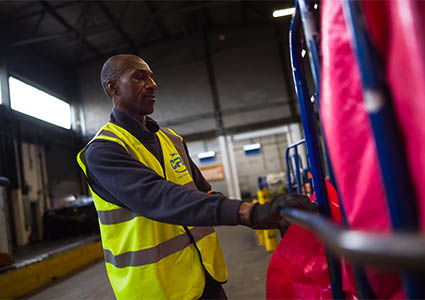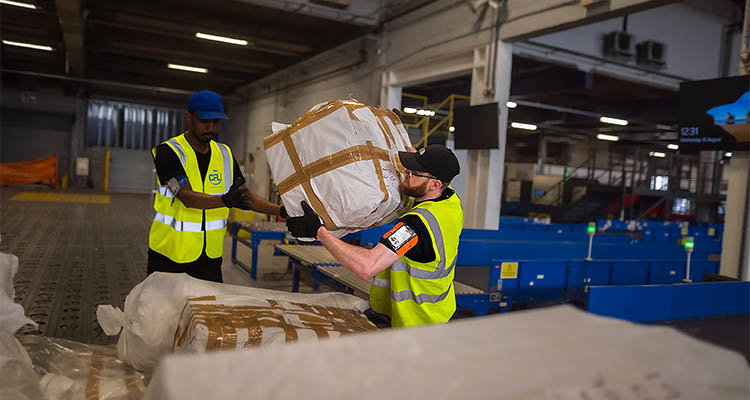Matthew Ware shares his view on why air freight resilience is crucial to managing global supply chains
With more than 20 years in the freight industry, Matthew Ware has gained invaluable experience and deep sector expertise. As the current CEO of CFL, Heathrow’s only on-airport express courier handler, Matthew oversees operations, working with nearly 30 airlines to provide customers with an unrivalled drop-off and collection experience for cargo shipments.
“I spent 16 years working at FedEx in a variety of positions, including running the FedEx Express courier facility at Heathrow Airport, which saw me join the executive board at CFL in 2013 as the shareholder representative for FedEx Express,” Matthew begins. “When CFL’s existing Managing Director left in 2016, I applied and was fortunate to secure the opportunity, later becoming CEO at the beginning of 2023.
“In a nutshell, CFL helps courier companies of all sizes move shipments in and out of the UK more quickly than any other means, and often faster than DHL or FedEx can manage. Our shipments can be collected around an hour after the flight has landed, meaning customers can make same-day deliveries from Heathrow to several regions in the UK.

“CFL is owned by its customers; we operate under not-for-profit guidelines and any profits are reinvested into the company. This enables us to offer competitive pricing, and we’re constantly looking for ways to create value propositions that compete with some of the industry’s major players. We recognize that we are a key part of our customers’ supply chains, enabling smaller players to compete with businesses like FedEx and DHL and create a diverse courier community across the UK.
“As the only non-profit courier facility currently operating in Europe, CFL is particularly unique,” he adds. “We strive to maximize air cargo on passenger aircraft, so we’re based at Heathrow, one of the most efficient airports in the world with an enormous number of flights across just two runways.”
Coherent cargo strategy
Turning to the relationship between freight and the economy, Matthew shares his view that to maximize the potential economic benefits, there needs to be standardized regulation when it comes to air cargo. “In the UK, air cargo accounts for around 40 percent of all goods moving into the UK, so if we want to grow the economy, we must recognize the significant role it plays,” he states.
“In many respects, the needs of cargo freight and aircraft passengers are very similar; they both need access to consistent capacity and strong infrastructure. However, for airports, cargo flights don’t typically generate as much revenue as passenger flights, and as airports are privately-owned and compete with one another, they are more likely to prioritize passenger flights.
“Having a national approach to airport cargo strategy would be a great way to regulate this problem and still allow airports to compete, while ensuring the wider economy is equipped for growth. Organizations like AICES, the trade body for international express courier services, and Aviation Services UK, the new trade body for ground handling services, are emphasizing the importance of having a coherent national strategy on cargo flight movements.
“This is particularly challenging when demand increases or airport capacity shrinks, as passenger flights often take priority, causing problems and uncertainty in supply chains that rely on air cargo. A coherent strategy would not only drive investment and greater efficiency at the hubs, but also enable airports to make decisions without concern for their bottom line.”
One way of overcoming such challenges and strengthening the reliability of supply chains is to implement mandatory cargo slots at airports. “At the moment, ad hoc slots are more often offered to passenger aircraft rather than cargo aircraft,” Matthew explains. “It’s important for airports to operate the right mix of cargo and passenger flights and although there is plenty of air capacity, it’s not currently managed in the most efficient way.
“Just recently, a senior executive at Schiphol Airport shared his desire for the Dutch Government to mandate two and a half percent of all slots to cargo aircraft, arguing that this would enable Schiphol to make decisions that benefit cargo. A framework with mandated or protected slots would increase both capacity and resilience across the UK’s aviation landscape, and operators would be more likely to invest in both airport hubs and regional airports. As UK businesses are predicted to grow by up to 40 percent over the next decade, we must create stable infrastructure to cope with increased air cargo demand. 
“However, mandatory cargo slots are just one solution. From a UK perspective, we must look at our national industrial strategy and infrastructure to make necessary investments that drive economic growth. We need a forum for all stakeholders to come together and discuss how we can create a framework that supports the country’s industrial aims and supports the wider economy.
“Many countries have robust industrial strategies around their airports, with some working alongside national couriers or receiving government support. In Türkiye, for instance, air cargo is used as the economy’s primary driver of growth, with the new airport in Istanbul specifically to facilitate cargo movements. On the other hand, the UK’s industry is very competitive, particularly around big infrastructure projects, as they require long-term thinking rather than considering the short-term impact for shareholders.
“Heathrow Airport has made significant investments in improving its passenger terminals, but we need to see equal investment in the cargo facilities,” he continues. “Over the last five years, CFL has made several investments, particularly in technology, and we’re the only operator at Heathrow using an EDS scanner to enhance security. We’ve also invested in digital vertical integrations to share real-time data with our customers and automate key processes like customs and arrivals.”
The future of air freight
The industry’s future is somewhat uncertain, according to Matthew. He anticipates that future investments will be focused on either environmental sustainability or consolidation of technologies. “I don’t think any modern business can ignore environmental responsibility,” he states. “We’re proud to have one of the smallest direct carbon footprints in our sector, which is getting smaller every year. Sustainable aviation fuel (SAF) alone is not going to solve all our problems; we must also support and invest in the development of new carbon capture technologies that reduce our impact.
“I also see continuation of some of the trends we’ve seen over the last five years or so, but current political uncertainty is forcing more companies to consider how to maintain a robust supply chain in a higher risk operating environment. We’re seeing migration from sea freight because of the crisis in the Red Sea, for instance. Behaviors like nearshoring will be ongoing, and as e-commerce continues to grow, there will be differences in the kind of commodities carried by air freight.
“As manufacturing increasingly moves away from China, we’re seeing players like India, the Middle East, and some areas of South Asia emerge as powerhouses to drive capacity,” Matthew concludes. “Air cargo will certainly continue to play a crucial role in global supply chains and there’s plenty of scope for further growth.”
